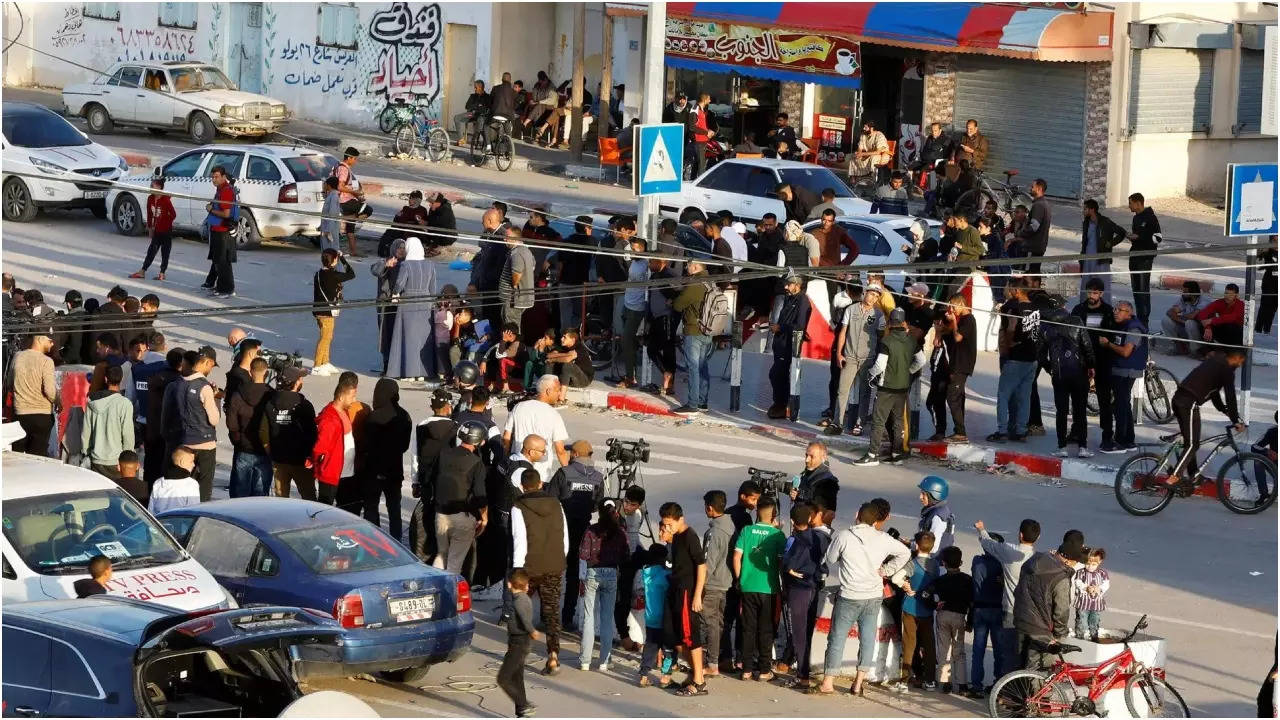
[ad_1]
As Israel and Hamas prepare for the next release of hostages and Palestinian prisoners on Sunday, a previous delay underscored the fragility of the temporary truce agreement.
The Egyptian government, which along with Qatar helped broker the deal and which oversees the crossing through which the hostages have been taken out of the Gaza Strip, said it had received a list of 13 Israelis and 39 Palestinians due to be exchanged Sunday.
There was no comment from Israel, Hamas or Qatar — which also served as a mediator in the negotiations for the agreement. Jake Sullivan, President Joe Biden’s national security adviser, said Sunday that at least one American citizen could be among the hostages to be released by Hamas later in the day.
But there was speculation over how smoothly the exchange would proceed after Hamas threatened Saturday to postpone the second hostages-for-prisoners trade, claiming that Israel had reneged on parts of the agreement. After an hours long delay, the exchange went ahead — Hamas handed over 13 Israeli hostages, and Israel released 39 Palestinian prisoners and detainees.
The delay raised fears that subsequent releases would be similarly fraught.
Comments by a Red Cross official, Pascal Hunt, to Sky News that he was “not confident” that the truce would hold were seized upon as a potential sign of trouble. The Red Cross soon issued a “clarification,” saying that Hunt’s remarks were “in no way an indication that the release operations planned for Sunday will not happen.”
“All preparations for the next release continue to move forward,” the Red Cross said in a statement. “These operations are delicate and complicated, and one can never be absolutely certain they will take place, given all of the complexities.”
There were no indications from Israeli or Hamas officials Sunday that plans for another exchange were not moving ahead.
Hamas, the Palestinian group that controls Gaza, had said that Saturday’s delay was because Israel had not allowed enough aid to reach northern Gaza and had not released Palestinian prisoners according to agreed-upon terms.
On Sunday, the Egyptian government said that 200 aid trucks had entered Gaza the previous day, including seven fuel trucks carrying 129,000 liters of diesel fuel. It said later that as of Sunday afternoon, 120 more trucks had entered — including two carrying fuel and two with cooking gas — and that the number was expected to increase in the coming hours.
How the exchanges and the truce play out could affect the trajectory of the war. Israel has said that it is prepared to grant another day’s pause for every 10 hostages Hamas releases beyond the 50 outlined in the agreement, but Hamas has not responded publicly to the offer.
An extended cease-fire could create more opportunities for other countries, particularly the United States, to pressure Israel to scale back its military goals. The Israeli response to the Oct. 7 Hamas-led attack on southern Israel has killed more than 13,000 Palestinians in Gaza, according to health officials there, leading to rising alarm among Israel’s allies about its campaign.
The Egyptian government, which along with Qatar helped broker the deal and which oversees the crossing through which the hostages have been taken out of the Gaza Strip, said it had received a list of 13 Israelis and 39 Palestinians due to be exchanged Sunday.
There was no comment from Israel, Hamas or Qatar — which also served as a mediator in the negotiations for the agreement. Jake Sullivan, President Joe Biden’s national security adviser, said Sunday that at least one American citizen could be among the hostages to be released by Hamas later in the day.
But there was speculation over how smoothly the exchange would proceed after Hamas threatened Saturday to postpone the second hostages-for-prisoners trade, claiming that Israel had reneged on parts of the agreement. After an hours long delay, the exchange went ahead — Hamas handed over 13 Israeli hostages, and Israel released 39 Palestinian prisoners and detainees.
The delay raised fears that subsequent releases would be similarly fraught.
Comments by a Red Cross official, Pascal Hunt, to Sky News that he was “not confident” that the truce would hold were seized upon as a potential sign of trouble. The Red Cross soon issued a “clarification,” saying that Hunt’s remarks were “in no way an indication that the release operations planned for Sunday will not happen.”
“All preparations for the next release continue to move forward,” the Red Cross said in a statement. “These operations are delicate and complicated, and one can never be absolutely certain they will take place, given all of the complexities.”
There were no indications from Israeli or Hamas officials Sunday that plans for another exchange were not moving ahead.
Hamas, the Palestinian group that controls Gaza, had said that Saturday’s delay was because Israel had not allowed enough aid to reach northern Gaza and had not released Palestinian prisoners according to agreed-upon terms.
On Sunday, the Egyptian government said that 200 aid trucks had entered Gaza the previous day, including seven fuel trucks carrying 129,000 liters of diesel fuel. It said later that as of Sunday afternoon, 120 more trucks had entered — including two carrying fuel and two with cooking gas — and that the number was expected to increase in the coming hours.
How the exchanges and the truce play out could affect the trajectory of the war. Israel has said that it is prepared to grant another day’s pause for every 10 hostages Hamas releases beyond the 50 outlined in the agreement, but Hamas has not responded publicly to the offer.
An extended cease-fire could create more opportunities for other countries, particularly the United States, to pressure Israel to scale back its military goals. The Israeli response to the Oct. 7 Hamas-led attack on southern Israel has killed more than 13,000 Palestinians in Gaza, according to health officials there, leading to rising alarm among Israel’s allies about its campaign.
[ad_2]
Source link
